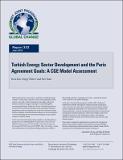Turkish Energy Sector Development and the Paris Agreement Goals: A CGE Model Assessment
Author(s)
Kat, Bora; Paltsev, Sergey; Yuan, Mei
DownloadMITJPSPGC_Rpt332.pdf (4.387Mb)
Metadata
Show full item recordAbstract
In the 2015 Paris Agreement, Turkey pledged to reduce greenhouse gas (GHG) emissions by 21% by 2030 relative to business-as-usual (BAU). However, Turkey currently relies heavily on imported energy and fossil-intensive power generation. Despite significant wind and solar energy potential, only 5.1% of its total power is generated by wind and solar installations; additionally, although two nuclear power stations are planned, no nuclear capacity currently exists. We expect that fulfilling Turkey’s Paris Agreement pledge will likely require a reduced reliance on fossil-based energy and additional investments in low-carbon energy sources, which may impact Turkey’s GDP, energy use, and electricity generation profiles. To fully assess these impacts, we develop a computable general equilibrium (CGE) model of the Turkish economy that combines macroeconomic representation of non-electric sectors with a detailed representation of the electricity sector. We analyze several scenarios to assess the impact of an emission trading scheme in Turkey: one including the planned nuclear development and a renewable subsidy scheme (BAU), and in the other with no nuclear technology allowed (NoN). Our assessment shows that in 2030, without policy, primary energy will be mainly oil, natural gas and coal. Under an emission trading scheme, however, coal-fired power generation vanishes by 2030 in both BAU and NoN due to the high cost of carbon. With nuclear (BAU), GHG emissions are 3.1% lower than NoN due to the resulting energy mix, allowing for a lower carbon price ($50/tCO2 in BAU compared to $70/tCO2 in NoN). Our results suggest that fulfillment of Turkey’s Paris Agreement pledge may be possible at a modest economic cost of about 0.8–1% by 2030.
Date issued
2018-07Publisher
MIT Joint Program on the Science and Policy of Global Change
Citation
Report 332
Series/Report no.
MIT Joint Program Report Series;332